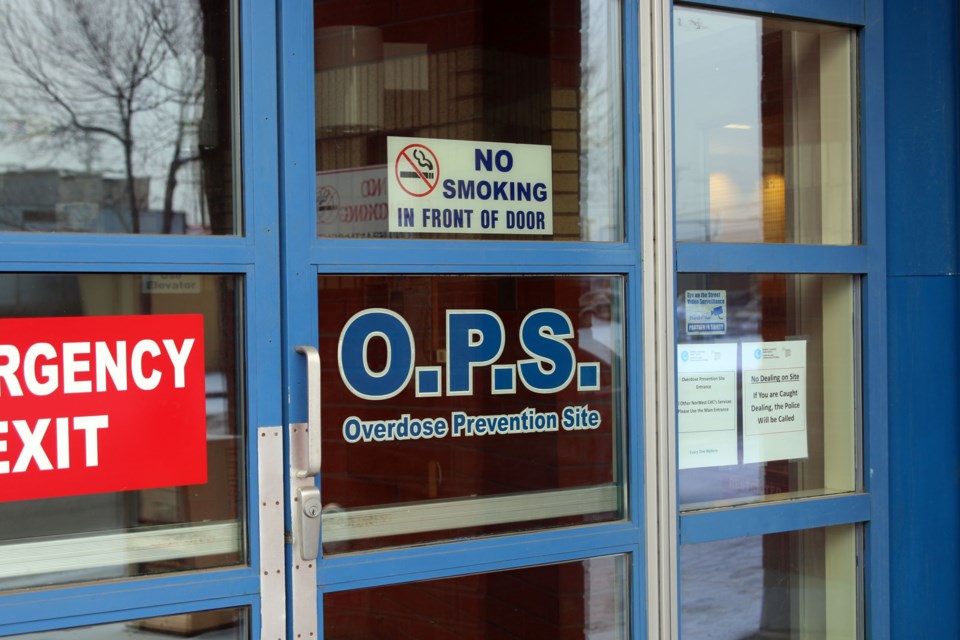THUNDER BAY – The City of Thunder Bay will call for a number of significant harm reduction responses to confront a worsening overdose crisis that has hit the city perhaps harder than any other in the province, including decriminalizing simple drug possession.
After a unanimous vote of city council on Monday, the city will advocate for the province to adopt policies, like increased funding for safe supply programs, that just a few years ago would have been seen as bold, but have since gained broad support from the public, politicians, and even police.
Some of the policies are likely to remain controversial, however – at least one councillor voiced her discomfort Monday with seeing the city back the decriminalization of hard drugs, which the federal government has so far approved on a limited basis in B.C.
The vote put the city’s support behind a package of policy positions outlined by the Drug Strategy Network of Ontario (DSNO), which represents 41 local drug strategy groups across the province, including the one led by the City of Thunder Bay.
Centred around four "pillars," the campaign seeks expanded funding for services like addiction treatment centres and safe supply and consumption programs, as well as calling to decriminalize the possession of drugs for personal use.
The city will also ask the province to declare the overdose crisis an emergency under the Emergency Management and Civil Protection Act, and create a provincial task force empowered to recommend policy changes to confront it.
Coun. Kristen Oliver (Westfort), chair of the city's intergovernmental affairs (IGA) committee, called attention to how the city has been “disproportionately impacted” by the opioid crisis in a memo to council.
Where morphine and methadone previously accounted for a majority of the city’s fatal drug poisonings, by 2018, fentanyl was present in 90 per cent of deaths – and has driven the total number of overdoses far higher, she noted.
Opioid-related deaths across the Thunder Bay district have spiked, rising from 16 in 2008 to 122 in 2021.
The district’s rate of 78.8 opioid-related deaths per 100,000 people was more than four times the provincial average of 19.2 that year.
Local leaders have welcomed recent provincial funding announcements for addiction treatment beds and transitional housing, but remain frustrated over the Ford government's failure to move more quickly to meet the scale of the problem.
A proposal for a 40-bed addictions and mental health crisis centre that's gathered support from dozens of local groups, for example, has languished with the province for years.
Councillors said Monday's vote reflected a need for immediate action on overdose and addictions, with several saying the issue tops the list of concerns for local residents.
"We all heard about this in the election," said Coun. Andrew Foulds (Current River). “I’ve knocked on a lot of doors in my years… I was surprised with how many doors, the number one issue was this. It wasn’t [just] from less affluent doors – there was no discrimination.”
"The fact that this is one of the first [resolutions] coming from this council I think sends a clear message."
A copy of the resolution will be sent to Premier Doug Ford, Minister of Health Sylvia Jones, a number of municipal associations, and each individual municipality across the province.
In an interview Monday, Oliver said the city's efforts will go beyond just sending letters, with leaders continuing to build consensus with other communities and working with provincial and federal counterparts to secure commitments.
“I’ve talked to mothers that have lost their children to drug poisoning, and it’s just growing and growing and growing,” she said. “We heard from a number of councillors, this was the number one issue [during the election]. Certainly the social crisis, the drug epidemic is something the community is very concerned about.”
She also voiced strong support for the policies council endorsed, saying they're based on expert advice on how to save lives.
“When we look at the recommendations coming from subject matter experts, they know best on how we should be moving forward,” she said. “The four pillars that have been put together in this province-wide platform, I think, really hit it out of the park and start identifying a way forward so that we aren’t seeing more people die.”
Coun. Rajni Agarwal (At-large) said she voted for the motion despite her opposition to decriminalizing hard drugs.
"I don’t think as a city we should say, hey, decriminalize all drugs," she said. "There’s a lot of people who know a lot about drugs, and a lot of people [whose] families have been affected by drugs [who] are very strongly against a lot of the very heavily addictive narcotics, and we’re not the professionals to say whether or not we should do it.”
More broadly, however, Agarwal said she supports a motion that ratchets up the city's advocacy work in an area where it's badly needed.
“The drug strategy is very important,” she said. “We need a detox centre, we need professionals within the field, we need to take care of the people who have addictions. It’s an illness – it’s not anything else but an illness.”
Asked how effective the city’s advocacy could be in moving the provincial government, Agarwal called it part of a rising chorus of calls that together could have an impact.
“When you asked your mother for the car, did she give it to you the first time?” she asked. “Not necessarily.”
“It’s just a matter of calling again and again… We all have to go with the same conversation to the government, together as a collective force. And if we do that, maybe the voice will be louder and maybe it will be heard.”
